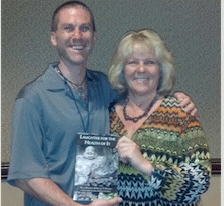DB: Laughter on the phone was started by Gaga and Khevin Barnes in 2006. They are still involved, with the support of several others, offering many laughter calls per day. [The details are here.]
There is also a Skype laughter club that has calls each day. [The schedule is here.]
As for the many health benefits of laughing, they include elevated mood, reduced stress, strengthened immune system, improved circulation, and increased tolerance for pain. There is also a general boost in energy and creativity, plus receptivity to learning, along with the bonding mentioned earlier. These changes occur because laughter stimulates not only oxytocin but also dopamine, serotonin and endorphins. Laughter oxygenates the blood and also reduces cortisol. We detail this with citations in Laughter For the Health of It and give some specific applications such as laughter techniques that will help reduce pain, anxiety, sleep problems and more.

Dave Berman and co-author Kelley T Woods at book launch, August, 2015, at the HypnoThoughts Live hypnosis conference in Las Vegas
(Image by courtesy of the authors) Details DMCA
JB: Wow! For people who might have a hard time getting started, you also provide some helpful videos. What have you got and can you give us a few examples*?
DB: We suggest that anybody having difficulty getting started doing unconditional laughter on their own first try joining with others. There is a global directory of laughter clubs at LaughterYoga.org. If there is not one nearby, then the Skype and phone options are helpful.
The videos you're asking about would be the next tip. Again due to mirror neurons, it is very common for people to laugh at the sight of others laughing. There are many YouTube videos that just show people laughing, often as a demonstration of this contagiousness. We include a bunch of links in the book. The one I love most is the Bodhisattva on the Metro.
JB: That is a fun one! It's almost impossible to watch without smiling, if not laughing out loud.
DB: Another one I like a lot is Dr. Kataria demonstrating silent laughter. This is one of my two favorite types of laughter. The other one is slow motion laughter. They both create a delightful strain in my cheek muscles. We otherwise say laughter yoga should not cause any strain and that all participants should modify any laughter exercise to be comfortable for their body. I'm quite comfortable with this feeling, one I think we all know and love, when you're face hurts from laughing. In the book, I describe a method to instantly trigger this feeling.
JB: Dr. K crafted Laughter Yoga mindfully, as a practice without rules. He wanted clubs, classes and programs to develop and evolve, each in their own direction, so there is a lot of variation. He has also sought to make it free and accessible to anyone who wants to practice it. And he has great hopes, perhaps you could call it a vision, as more people participate. Can you tell our readers about that, Dave?
DB: My experience has been that laughter yoga is all those things. Dr. Kataria seems very pleased with how it has spread and grown and continues to develop.
Just as the brief founding story is typically told at the start of laughter yoga classes, it is common at the end of a class to mention that Dr. Kataria considers world peace through laughter to be the mission of laughter yoga. In our interview he also explained how practicing unconditional laughter teaches spiritual lessons, such as nothing is permanent, nothing is perfect, we are all one, karma, kindness, and forgiveness.
JB: Lovely. It sounds like you're wrapping things up but I'm not quite ready. Laughter Yoga is well incorporated into your personal as well as professional life. How do you use it in your daily routine?
DB: There are many ways unconditional laughter has become part of my personal life and daily routine. It starts as soon as I wake up. I stand in front of the mirror, tap all over my body and hop around while laughing. Two or three minutes of this is an invigorating energy boost to begin the day feeling good with a positive mental attitude.
Laughter is often my default response to stupid little irritations in life. But when it doesn't happen automagically, and I notice myself getting irritated, frustrated, annoyed or stressed, that awareness makes the situation seem silly to me and so I laugh because I know my feelings aren't coming from anything outside of me. They only come from my thoughts.
Another thing I love to do is point and laugh at the wagging tails of the two dogs I live with. This leads them to wag their tails faster and get excited. This amuses me, leading to even more laughter. I'd really like other people to try this and let me know how their dogs respond.
(Note: You can view every article as one long page if you sign up as an Advocate Member, or higher).





